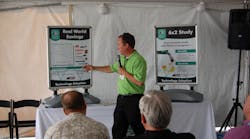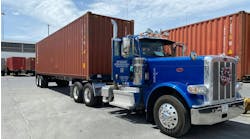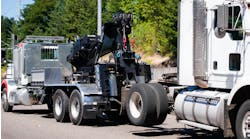A workshop in Chicago hosted by the North American Council on Freight Efficiency (NACFE) under the auspices of the annual CALSTART National hybrid truck users forum (HTUF) this week examined myriad ways to help boost the fuel efficiency of Class 8 equipment – looking at everything from tire pressure monitoring systems (TMPS) to axles configurations and anti-idling technology.
“What we’re trying to do is get everyone in one room – fleets, OEMs, and other suppliers – to get feedback on the confidence reports we’re issuing on various fuel saving technologies to see what’s really working out in the real world,” Mike Roeth, NACFE’s executive director, explained to Fleet Owner by phone from Chicago.
“We’re not able to know everything, so we asked ourselves, ‘how do we get feedback?’ And we figured a workshop that gathered key trucking players together would do it,” he said. “We’re also now planning more ‘regional’ workshops down the road to reach more trucking managers.”
Roeth added that NACFE organized a panel discussion for the 50 attendees to its first workshop to get a broad view of fuel efficiency efforts, with speakers including: Scott Perry of Ryder System; Mike O’Connell from Frito Lay; Steve Phillips from TL carrier Werner Enterprises; Bill Kozek, president of truck maker Navistar; John Nelligan from Meritor; and Jeremy Kranowitz of environmental interest group Sustainable America.
One of the major challenges where truck fuel efficiency efforts are concerned is managing the “tradeoffs” inherent when making particular spec’ing choices, Roeth noted.
“You can make spec’ing decisions on how to lighten a tractor’s tare weight to get better fuel economy, but how does that choice potentially impact reliability long term?” he said. “In reality, taking a ‘systems approach’ to fuel economy is really still a relatively new engineering discipline in trucking, often resulting in ‘one step forward two steps back’ situations. It’s not easy to boost truck efficiency; it takes a lot of effort.”
Yet the focus on truck fuel efficiency efforts will only intensify as fuel remains a major and still-growing cost component within trucking operations, Roeth pointed out. “Just look at a recent report from ATRI [American Transportation Research Institute] that found fuel cost trucking an average of 64.1 cents per mile (CPM) in 2012,” he stressed. “Compare that to the 20 CPM trucking paid nine years ago and you see why fuel efficiency is so critical now.”
Still, Roeth noted that there are plenty of potential fuel savings to be had in trucking, with many sources of information for the industry to examine.
“For example, we brought an owner-operator to our workshop who’s been getting 10.5 mpg for the last several years with his tractor and trailer,” he said. “Now, sure, the argument is he has more control over how to spec both tractor and trailer together since he owns both, but his fuel CPM is 38 cents versus the industry’s average of 64.1 cents. So there’s definitely something that can be learned from his experience.”



